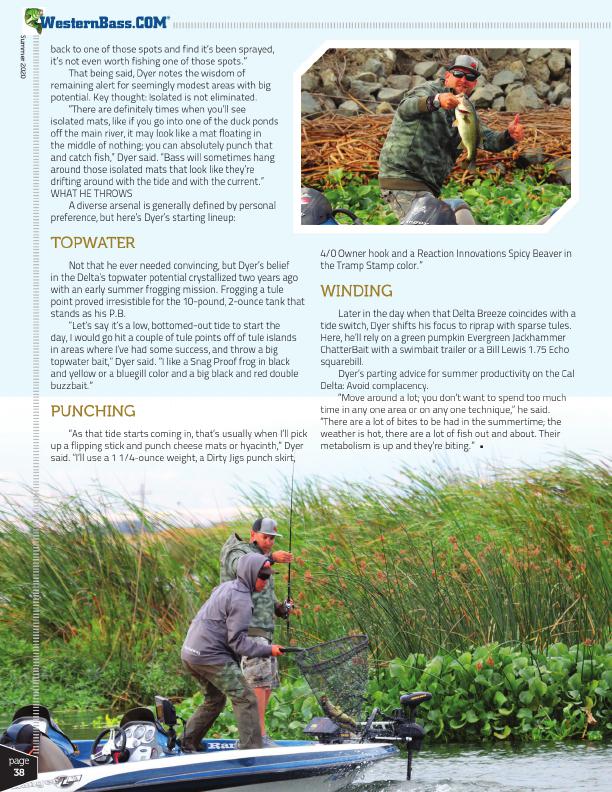
Summer 2020
®
back to one of those spots and find it’s been sprayed, it’s not even worth fishing one of those spots.”
That being said, Dyer notes the wisdom of remaining alert for seemingly modest areas with big potential. Key thought: Isolated is not eliminated.
“There are definitely times when you’ll see isolated mats, like if you go into one of the duck ponds off the main river, it may look like a mat floating in the middle of nothing; you can absolutely punch that and catch fish,” Dyer said. “Bass will sometimes hang around those isolated mats that look like they’re drifting around with the tide and with the current.” WHAT HE THROWS
A diverse arsenal is generally defined by personal preference, but here’s Dyer’s starting lineup:
TOPWATER
Not that he ever needed convincing, but Dyer’s belief in the Delta’s topwater potential crystallized two years ago with an early summer frogging mission. Frogging a tule point proved irresistible for the 10-pound, 2-ounce tank that stands as his P.B.
“Let’s say it’s a low, bottomed-out tide to start the day, I would go hit a couple of tule points off of tule islands in areas where I’ve had some success, and throw a big topwater bait,” Dyer said. “I like a Snag Proof frog in black and yellow or a bluegill color and a big black and red double buzzbait.”
PUNCHING
“As that tide starts coming in, that’s usually when I’ll pick up a flipping stick and punch cheese mats or hyacinth,” Dyer said. “I’ll use a 1 1/4-ounce weight, a Dirty Jigs punch skirt,
4/0 Owner hook and a Reaction Innovations Spicy Beaver in the Tramp Stamp color.”
WINDING
Later in the day when that Delta Breeze coincides with a tide switch, Dyer shifts his focus to riprap with sparse tules. Here, he’ll rely on a green pumpkin Evergreen Jackhammer ChatterBait with a swimbait trailer or a Bill Lewis 1.75 Echo squarebill.
Dyer’s parting advice for summer productivity on the Cal Delta: Avoid complacency.
“Move around a lot; you don’t want to spend too much time in any one area or on any one technique,” he said. “There are a lot of bites to be had in the summertime; the weather is hot, there are a lot of fish out and about. Their metabolism is up and they’re biting.” •
page 38